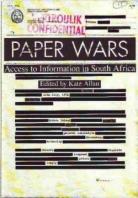For almost twenty five years, the story of the Cradock Four has been shrouded in mystery. When film maker David Forbes at Shadow Films set out to create a film investigating this case, one of the most notorious state-sanctioned murders undertaken by South Africa's apartheid-era security forces, SAHA became involved in assisting Forbes in a long battle to gain access to records related to the case using the Promotion of Access to Information Act (PAIA). Seven years later, the long-anticipated project is finally close to completion, comprising two elements: one full-length feature entitled ‘The Cradock Four', as well as a 52-minute made-for-television version produced byDavid Forbes and Michell Noll.
The mystery of the Cradock Four
Matthew Goniwe and Fort Calata, both teachers and activists, were targeted for assassination for inciting political resistance in the Eastern Cape. Late on June 27, 1985, Goniwe and Calata, as well as Sparrow Mkonto and Sicelo Mhlauli, were abducted by security police. They were never seen alive again. Their charred remains were later discovered near the Port Elizabeth suburb of Bluewater Bay. This was one of the most notorious events of the apartheid regime, yet little was known about the circumstances of their deaths; David Forbes was particularly intrigued. In 2003 he decided to produce a film that would both document their lives and explain their deaths. Forbes created the C4 Trust, with the Cradock Four widows as trustees, as a way of channeling film profits back to their families.
SAHA and the Cradock Four
The film was originally meant to be released on the 20th anniversary of the death of the Cradock Four, but this was delayed by legal battles to gain access to records related to the case. SAHA's assistance was clearly necessary, due to the surprisingly obstructive stance taken by the Department of Justice in releasing the case records. This resistance even went so far as to see the Department approaching the widows directly and forcing them to sign affidavits refusing the release of the records in a manner which clearly contravened the carefully constructed sections in PAIA relating to 'Third Party Notifications'. The Department's continued refusal made it necessary for SAHA and Forbes to seek remedy in the courts. However, faced with litigation the Department finally relented to release - but not before delaying the production of the film past its memorial date.
Forbes' experience of using the Promotion of Access to Information Act No 2 of 2000 (PAIA) to gain information pertaining to the Cradock 4 case, including SAHA's central role in litigation against the DOJ, is detailed in SAHA's 2009 publication, Paper Wars: Access to Information in South Africa, edited by Kate Allen. Richard Calland refers to the Cradock Four case in his chapter ‘Illuminating the Politics and Practice of Access to Information in South Africa' while former SAHA director Piers Pigou discusses the legal implications of the Cradock Four case in his chapter entitled ‘Accessing the Records of the Truth and Reconciliation Commission.'
Visit David Forbes' Cradock Four website for more information on the Cradock Four and his films
Learn more about our Freedom of Information Programme.
Related SAHA collections
David Forbes Collection
Forbes has had a long-standing relationship with SAHA. He has donated a fortune of material related to his own work. This collection includes a range of student newspapers from different universities from the late 1970s to early 1980s. Forbes was involved as contributor and as part of the editorial teams for these newspapers. Forbes also donated a significant number of 1994 elections posters (mostly posterboards) to the archive.
The Freedom of Information Programme (FOIP) Collection
The Freedom of Information Programme (FOIP) collection includes apartheid era security establishment records, documents created by the South African government bodies and agencies post- apartheid, and documents from several private bodies. One of the Special Projects undertaken by the South African History Archive (SAHA) to test the parameters of freedom of information in South Africa includes materials relating to the Truth and Reconciliation Commission (TRC). This includes a report regarding phone taps on Matthew Goniwe and others; the report was used as evidence in the amnesty hearings. [See AL2878_A2.2.15]







